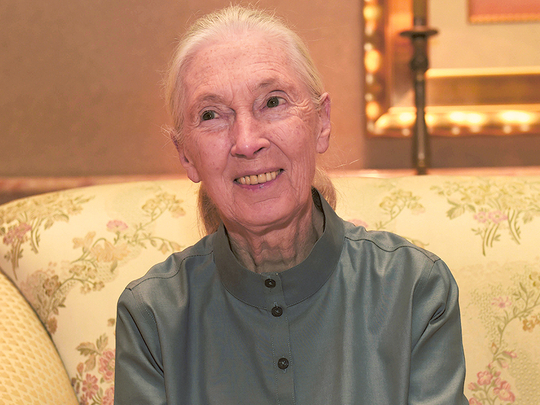
Abu Dhabi: The world’s most famous primatologist is quiet and unassuming as she casts an upward glance into the cavernous marble and gold-inlay ceiling of Emirates Palace.
A soft-spoken Dr. Jane Goodall confides she has been to Abu Dhabi before but never stayed in the iconic hotel or witnessed its majestic grandeur.
From solar-powered farms and bringing the Arabian Oryx back from extinction, to reducing the carbon footprint and Masdar’s work to create an ecologically sustainable city, Goodall says the UAE is well on its way to being at the forefront of preserving natural heritage for future generations.
Her mere presence in the gold-accented palatial passageways is a study in contrast to a humble life eked out in the wilds of African jungles in her youth where she made a name for herself via breakthrough scientific discoveries about the behaviour of humankind’s closest cousins — chimpanzees.
Her foray into the remote corners of Africa were a long way away from her innocent days as a child in London — as a daughter of a businessman and a novelist for a mother — where her favourite distraction was a toy chimp doll named Jubilee.
Beginning in 1960, the London native’s observations of wild chimps in Tanzania’s Gombe Stream National Park revealed real communities using higher levels of communication, sticks as tools to retrieve termites for food and violence for social domination and even cannibalism.
Her work in association with famed Kenyan archaeologist Louis Leakey, challenged science of the day and turned heads around the world, jumpstarting what would become a globally recognised career highly documented through film and contemporary media and helping to trigger the early years of the global environmental movement.
Fifty-plus years, 15 books, and eight honourary doctorate degrees later, the 81-year-old anthropologist, ethologist and UN Messenger of Peace is certainly not resting on her laurels.
In an interview with Gulf News, Goodall insists there is still time to rescue the planet from an seemingly endless stream of emerging doomsday warnings of planetary epoch that appear almost daily now in print, television and through social media.
From the recent revelation that the world is in its sixth mass extinction amid global warming and rising ocean salinity, depleting fish stocks and genetically modified foods, Goodall said it is understandable that people may be inclined to believe that there is no way back for the planet.
But there is hope, she insists, and it lies within each one of us.
It isn’t a coincidence that the titles of her last four books each held the word “hope”.
One of the keys of that hope for a better environmental tomorrow, she says, is by reversing the oft-used phrase, “think globally, act locally”.
“Think globally, act locally is wrong,” says Goodall. “If we think globally, we have no appetite for doing anything. Why should you? I always put it the other way around. It’s the whole point of our youth movement. If you act locally, and you can see that you can make a huge difference in one little area, and then you think that in 136 countries there are young people doing the same sort of thing, you realise it works.
“If you do something and you see it working, one, it gives you satisfaction — especially when someone says you can’t do it. And secondly, knowing that other people are feeling and doing the same gives us something to hope for. It is the idea of accumulative effect of millions.”
If people don’t collectively begin to work in their own local environments, “it is unquestionable that if we carry on business as usual, we are doomed, I am sure about that,” says Goodall.
The hope for the planet rests squarely in the embrace of young people who will someday be decision makers and hopefully among the millions who act locally, she says.












